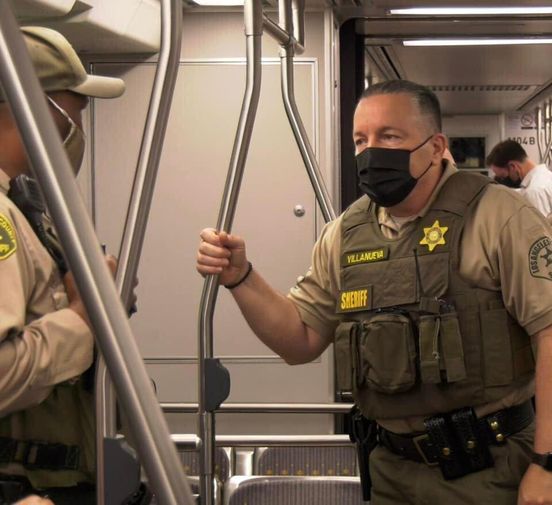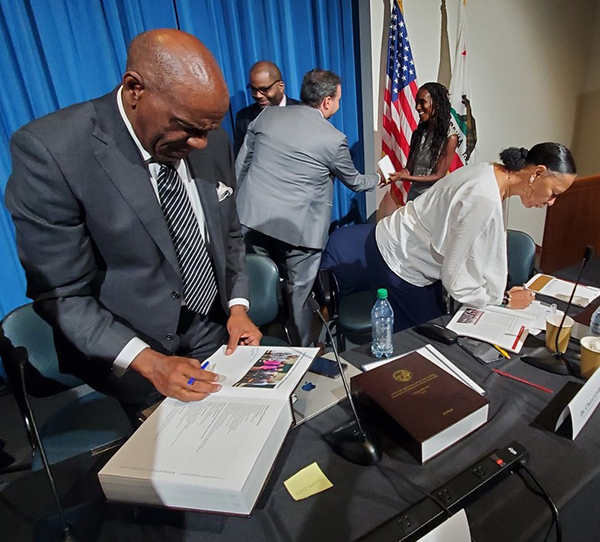MTA board increases contract costs for security

Wave Wire Services
LOS ANGELES — The board of directors of the Metropolitan Transportation Authority has voted to increase the transit agency’s current contracts with law enforcement agencies, while approving a motion aimed at pursuing alternatives to police through recommendations from the Public Safety Advisory Committee.
The first approved motion added $75 million to its current contracts with law enforcement agencies and extended the contracts an additional six months, through December 2022, with the option to extend an additional six months after that. The increase was to account for the departments over-spending their contracts. The board also voted last March to increase the contracts by $36 million due to over-spending.
According to the motion, during the currently authorized up-to-18 months that the contracts are extended, the Public Safety Advisory Committee would have time to bring forward alternative procurement recommendations. The committee was created in the aftermath of George Floyd’s murder by a Minneapolis officer in May 2020. Its mission is to help the MTA create a community-based approach to public safety.
The board Dec. 2 also approved a motion to commit $40 million in the fiscal 2023 budget, which begins in July 2022, for public safety alternatives and direct MTA leaders to develop a strategy that identifies certain stations for reimagined public safety pilot programs and consult with the committee on the design, implementation and evaluation of the pilots. The board previously voted last March to commit $40 million to public safety alternatives in the 2022 fiscal year, which runs through June 30, 2022. The MTA’s Judy Gerhardt told the board that none of the $40 million allocation has been spent yet and staff is working on the details with the committee.
That $40 million in the current fiscal year was designated for efforts such as transit ambassadors, elevator attendants and a flexible dispatch system to enable a response by homeless outreach workers, mental health specialists and unarmed security ambassadors. Transit ambassadors would be trained in de-escalation and customer service to support transit workers and riders.
Under the motion approved by the board, MTA staff will report to the board in February on the status of initiatives funded by the first $40 million.
Councilman Mike Bonin, who introduced the motion, focused on alternatives to policing, said his motion would “build on the work that this board has already done, starting with the forming of the [Public Safety Advisory Committee] in June of last year, and then investing over $40 million as a down payment for standing up alternative public safety strategies in March of this year. It’s an attempt to bridge the gap between [the committee’s] recommendations” and the staff’s recommendations to extend law enforcement contracts.
The Alliance for Community Transit-Los Angeles, which has advocated for an alternative to policing on MTA buses and light rail systems, said after the vote: “While ACT-LA opposes the additional $75 million for [the MTA’s] mismanaged and overspent policing contracts, we applaud [the] vote to further commit and allocate $40 million to non-policing safety strategies on our public transit system, including: a transit ambassador program, new outreach and resources for unhoused riders and more resources that will provide safety for all transit riders.”
Dozens of people called into the MTA board meeting supporting alternatives to policing and a reinvestment of police funds, as well as from people urging the board not to remove law enforcement from buses.
Sheriff Alex Villanueva took to Twitter Dec. 1 urging people to call into the meeting, saying that “the vote is to remove law enforcement and replace with ‘ambassadors,’ despite the board being scheduled to vote on both an increase in funding for law enforcement under current contracts and an extension of the contracts for up to 18 months.
County Supervisor Kathryn Barger, who serves on the MTA Board of Directors, said the continued funding for law enforcement on the transit system “was the right thing to do.”
“As a … board member, I firmly believe that our solutions to making that a reality must be balanced,” Barger said. “This isn’t an ‘either/or’ situation. We need a multi-layered approach to safety and security. Eliminating specialized police for the system or defunding the police … is and will always be the wrong thing to do,” she said after the vote.
Supervisor Janice Hahn had previously amended the motion to require that law enforcement contracted with the MTA have enforced vaccination mandates.
However, during the meeting, the board decided to first have the MTA staff report to the board in early 2022 with a recommended approach tobimplement the requirement.
Bonin, describing the vision he had in introducing the motion to invest in alternative public safety models, said, “We can achieve public safety more effectively if we use the right tool for each job with a layered public safety strategy.”
MTA staff provided visuals for this idea with an upside-down pyramid graph, in which the transit ambassador category is the largest section at the top, filtering down to community partnership/homeless and outreach services, security and then law enforcement.
“Law enforcement is a greatly reduced supporting role that is primed to respond quickly, rapidly to emergencies where force may be necessary,” Bonin said.
Mayor Eric Garcetti said during the meeting that he wanted to speed up the process for transit ambassadors through an earlier pilot program.
“I’m a little disappointed, why is it taking so long for ambassadors to actually get started up?” the mayor asked. He added that he wants a transit ambassador pilot program in place by June 2022.
“Let’s see what works, let’s fix what doesn’t. Let’s not do it while taking away resources from security officers or law enforcement, but put them side by side,” he added.
Board member Ara Najarian said he was concerned about the role of transit ambassadors.
“How is an ambassador going to deter crime, how is an ambassador going to stop a crime in progress, how is an ambassador going to apprehend someone who has committed a crime?” he asked.
He also said he was concerned about what he believed was a lack of diversity on the Public Safety Advisory Committee, saying there were no law enforcement experts or crime victims on the committee.
Several people called into the meeting to encourage more policing on the transit system, some citing an increase in violent crime.
According to the Los Angeles Times, violent crimes on MTA buses and trains has risen about 25% in 2021 through September compared to the same time last year, though ridership did decline in 2020 due to the pandemic before rebounding in 2021.
Violent crime in 2021 is about 9% higher than in 2019, with some crimes, including aggravated assaults, surpassing pre-pandemic levels. Bus and rail ridership remains lower than it was before the pandemic, according to The Times.
Other callers urged the board to immediately end contracts with the police and invest in alternatives to policing, citing police violence and a disproportionate number of Black riders cited by officers.
Advancement Project California, a progressive nonprofit focused on racial justice, took to Twitter to urge the MTA to end its policing contract, citing data that up to 50% of citations were against Black riders, who make up about 18% of all ridership.





